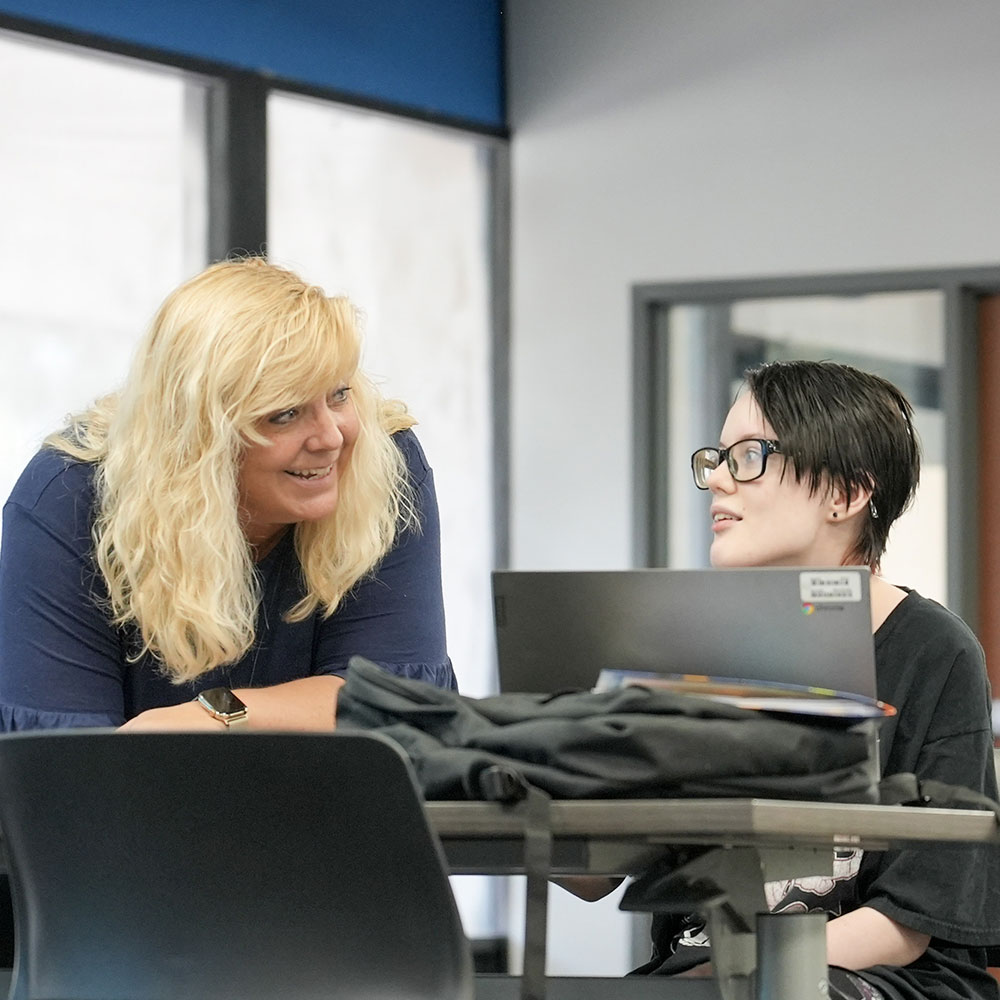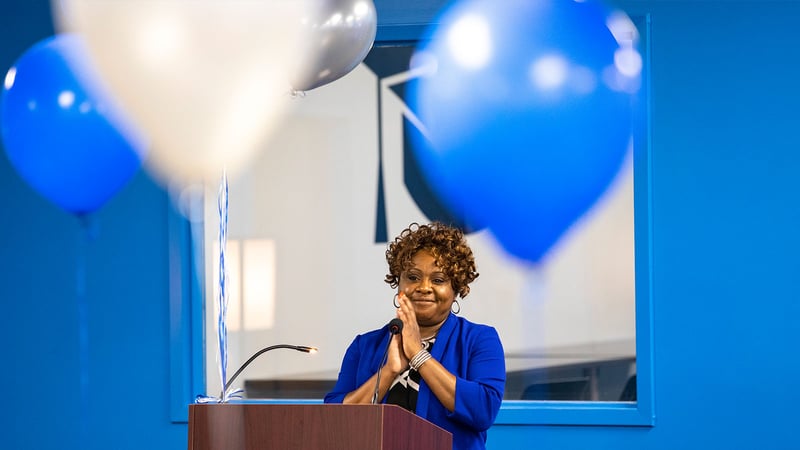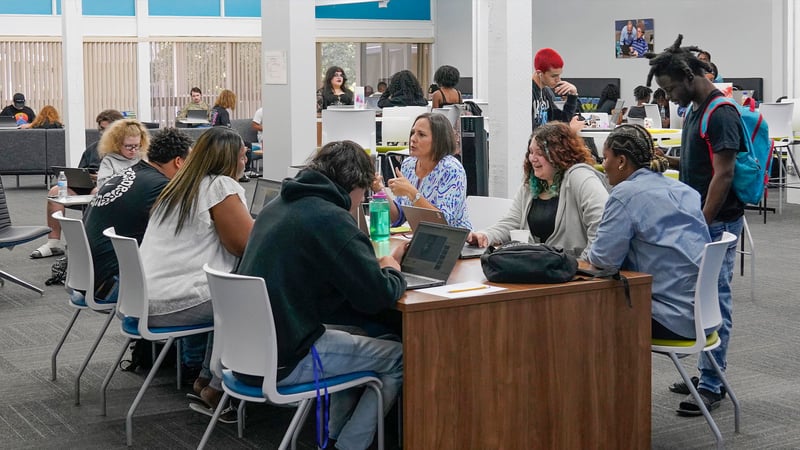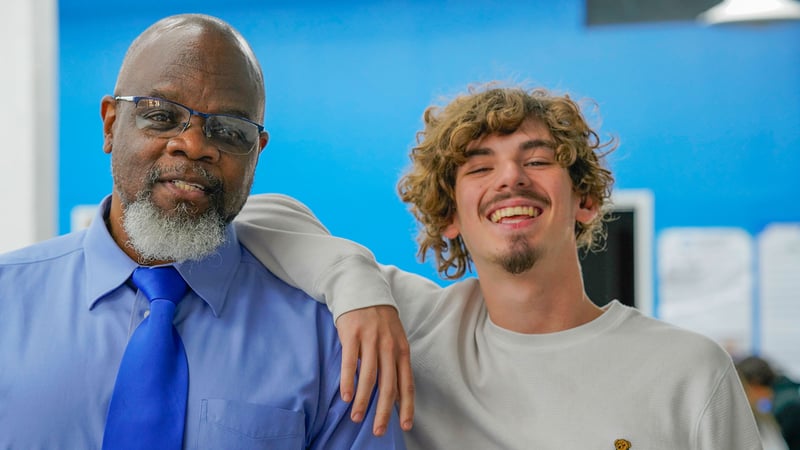At Acceleration Academies, a Commitment to Removing the Non-Academic Barriers to Academic Success
April 17, 2023 | Jeffrey Good

At Lowcountry Acceleration Academy — like its sister schools across the United States — it’s impossible for young learners to get lost.
Instead of having to raise their hand in a crowded classroom to get a teacher’s attention, they are surrounded by teams of caring educators — licensed teachers, trained counselors and advocates whose job is to help overcome the academic and non-academic barriers to success.
Late one afternoon a year and a half ago, that personalized attention may have saved a young woman’s life at the Lowcountry academy in North Charleston, South Carolina.
On that day, graduation candidate advocate Janell Reyes noticed that one of the graduation candidates on her caseload — a serious-minded 16-year-old known among LAA team members as the “Quiet Storm” — had disappeared into the bathroom for an alarmingly long time. Reyes went in to check on her, asking, “Are you okay?”
From inside her bathroom stall, the young woman said she was, but Reyes wasn’t so sure. She enlisted the help of Dr. Jacinta Bryant, a veteran South Carolina educator and the academy’s founding director. Bryant opened the door to the bathroom and took a gentle approach, saying, “We have our cleaning crews coming in a moment and we don’t want any strangers coming in while you’re here.”
“I can’t come out,” came the reply, soft and anxious.
Bryant persuaded her to open the door, saw blood in the toilet and, after they had retreated to a quiet room, the cut marks on her arms. The young woman handed over a collection of razors and a knife, confessing that she had wanted to end her life.
The young woman’s sorrow poured out: she had lost a sibling, her mother had to go into dialysis and the family had lost their home. She just wasn’t sure she could face it all anymore.
“She was tired of living in a motel and afraid to lose her mom,” Bryant recalled. “Her life had just gone broken.”
Bryant and her team stood ready to help her heal.

Dr. Jacinta Bryant, a veteran South Carolina educator and Lowcountry Acceleration Academy’s founding director.
‘Don’t Call Us Dropouts. The System Pushed Us Out’
On any given day in the United States, nearly 2 million young men and women who should be laying the foundation for their futures are instead scraping by as high school dropouts — and that doesn’t even count the millions more who have grown disengaged and are at risk of quitting.
In hopes of giving those young Americans their last best chance at a diploma and the opportunities it can bring, a group of reform-minded educators and investors in 2014 founded Acceleration Academies.
Today, there are 17 Acceleration Academies campuses educating more than 4,400 high schoolers in Florida, Georgia, Kansas, Nevada, South Carolina and Washington State — a network that is rapidly growing.
Working in partnership with local public school districts, the academies offer a personalized, flexible and focused path to students who have not found success in traditional schools. The diplomas they earn will open the door to higher education, military service, trade schools, and rewarding careers.
The benefits to students, their loved ones and society are clear: Over the course of their lifetimes, high school graduates earn at least $500,000 more than those who drop out. They are significantly less likely to rely on public assistance, suffer poor health or spend time behind bars. Their futures shine brightly.
Acceleration Academies is the brainchild of Dr. Joseph Wise and David Sundstrom, veteran educational leaders who studied thousands of high school dropouts a decade ago and saw the need for a different way.
While many assume that dropouts lacked intelligence, drive and a sense of purpose, Wise and Sundstrom learned otherwise.
“It was not because the kids were consciously choosing to reject what was on the table for them. It was just the opposite — they felt they had been rejected,” recalls Sundstrom. Wise adds, “ ‘These kids said, ‘Don’t call us dropouts. We were pushed out. The system pushed us out.’ ”
Life Challenges that Derail School Success
Traditional public schools are, by necessity, designed to educate large groups of students in largely the same way. Students go to school from early morning to mid-afternoon, take multiple courses each term, and do most of their in-person learning in classrooms where overworked teachers can only provide a limited amount of individual attention.
There is a strong focus on coursework and academic progress in traditional schools. They are structured, organized and staffed for scale — designed to maximize the number of students who graduate annually.
Many school districts across the country take pride in boasting graduation rates of 85%, 90%, 92%. But what about the remaining 8, 10 or 15 percent, thousands of students who have not been able to graduate?
Acceleration Academies educators found that one-size-fits-all schooling didn’t meet the needs of those 2 million dropouts — a group roughly equal to the population of Houston, America’s fourth largest city — and others who are at risk of joining their ranks.
Students who must work to support themselves and their families and can’t follow traditional school hours, who are easily distracted, who suffer from anxiety, depression and bullying, who need more one-on-one time with teachers and counselors, who work best when focusing on one course at a time, or who simply want to accelerate their studies and move on to the next chapter — all cry out for a different approach.
“These are not academic barriers; they are characteristics of real people that don’t work well in the educational factories of today,” says Acceleration Academies CEO Steve Campbell.
Getting to Know — and Support — Each Learner
Students enrolling at a traditional high school arrive with a transcript their teachers are unlikely to read and a complex set of personality traits and life circumstances that might — but, most likely, will not — emerge in the course of busy school days.
At Acceleration Academies, educators deliberately slow the pace down and get to know each young learner as an individual. For these students, academic progress only comes once educators are able to establish meaningful personal connections with the students. It’s only once they understand their unique life circumstances, challenges and obstacles, are they able to craft an educational strategy that flexes to their needs.
“We really take the time to get to know the GCs one-on-one first, get a sense of who they are, what they want to do in life,” says Hashima Carothers, a former college basketball standout and interim Director of Gwinnett County Acceleration Academies in suburban Atlanta.

At Acceleration Academies locations across the nation, students complete coursework in spacious and comfortable environments that resemble a coffee shop more than a school.
From day one, each learner is assigned a graduation candidate advocate (GCA) who will serve as their personal mentor, cheerleader and problem-solver. Students — they’re called “graduation candidates” (GCs) to remind them of their goals — only take one course at a time, allowing for them to develop close relationship with one teacher (called content coaches) at a time. They meet with life and career coaches who take stock of their needs and help them map a personalized path to graduation.
That personal attention, says CEO Campbell, “is our secret sauce.”
Recently, one-on-one assessments have been bolstered by the Graduation Persistence Index (GPI), a tool developed by Acceleration Academies that invites learners to answer more than 100 questions that provide deep insight into the barriers faced by each individual.
Beginning in 2023, all incoming graduation candidates were asked to complete the GPI, says Diana Good Solis, Executive Director of Model Fidelity. The results were striking: While the learners arrived with a powerful desire to earn their diplomas, more than two-thirds fear they lack the organizational, learning and self-regulation skills needed to succeed.
“They’re asking us for another chance – they want this, for themselves, their families, their communities. And often, when they first join us, they’re not sure how to make that happen,” she said. “So we get to work, providing targeted interventions, both academic and non-academic, to reverse that sense of doubt that has crept into so many of them over the years.”
Academic doubts are often based in life challenges outside of school, says Carothers, the Gwinnett leader. “A lot of times, it’s not really academic barriers that are leading them to drop out.”
Life barriers — including homelessness, poverty, teen pregnancy, bullying and the need to work full-time — are ones many have had to navigate alone. “Most of them have never been listened to, have never been heard.”
At Acceleration Academies, that changes — in a heartbeat.
Sarasota Acceleration Academies (SAA) graduate Mya Kirce proudly stands with her high school diploma. After graduation, Mya became a successful home health aide, brain trauma caregiver and aspiring registered nurse. She credits the personalized support she received at SAA.
Mya Kirce transferred to Sarasota (FL) Acceleration Academies (SAA) as a high school senior who had undergone family turmoil, homelessness and a collapse of hope. “I didn’t have any place to stay. I was dirty and I just didn’t want to go to school,” she says. “I gave up.”
But then a friend told her about SAA, where a team of educators welcomed her like family. “Once I saw how invested they were in picking me up, it just made me want to do better.”
Instead of long rows of desks and crowded classrooms, Mya found an open, airy learning space with comfortable chairs, soft lighting and a shelf stocked with food for breakfast, lunch and snacks.
Most important, though, was the deeply personalized attention. Frank Cruz, the warm and wise-cracking graduation candidate advocate and his fellow educators provided warmth, welcome and a dose of tough love when needed.
Mya regained her footing, graduated and went on to become a successful home health aide, brain trauma caregiver and aspiring registered nurse. She credits the personalized support she received at SAA.
“I had given up on myself,” she says, wiping a tear from her eyes. “They put me back together.”
Getting to Know — and Support — Each Learner
Education Week last fall featured Acceleration Academies as a leader in re-engaging students who had lost ground during the Covid pandemic that shuttered schools across the nation.
Much of that success is due to the personalized attention teams in the academies provide to graduation candidates.
“We are seeing more and more kids coming to us with trauma and mental health issues. It’s not unusual for us to see kids suffering with suicidal ideation,” Dr. Margie Sharp, Chief Education Officer and Executive Vice President, told Education Week.
Campbell, a leading technology entrepreneur who became CEO in 2021, is fascinated with the work of using data-driven education and deeply personalized attention to fuel student success. Acceleration Academies is not just an innovative way to personalize high school, he says. It’s a way to, literally, save lives.
“We are known as Acceleration Academies, and the focus is always on academic progress,” Campbell says. “But the magic of what we do is the non-academic work.”
“We help them reconnect with their ‘Why,’” he says. “We help them understand the obstacles and help them dig in — re-ignite the inner fire.”
Wayne Livingston is one of the people Campbell refers to as “fire starters.” A longtime public educator in Marion County, Florida, Livingston signed on to be Director of a recently opened academy there that already has 265 graduation candidates and is growing by the day.

Wayne Livingston, director of Marion County Acceleration Academies, helps learners identify barriers to academic success so they can address the problem together.
“It sounds generic when you first hear it: identify what the problem is so you can work on it,” says Livingston. “But it’s not always simple. It’s getting under the surface to identify what circumstances caused the barrier.”
He cites the example of one graduation candidate, the daughter of Mexican immigrants who wanted to succeed in school but wasn’t sure of who she wanted to be or whom at school she could trust. At first, Mako Velez needed to work quietly one-on-one with her mentor and subject coach to gain the self-confidence she had lost in traditional school. Only then could she enter the main learning area, begin studying with classmates and — over time — emerge as a leader.
“My first step with GCs is helping them figure out who they are,” says Livingston — because many arrive feeling, “I’m not quite what society has labeled me to be.”
Chris Turner leads Wichita Acceleration Academies (WAA), which has become a safe haven for two groups of learners with particularly acute life challenges. Some are teen parents, mostly young moms who lack the resources for child care and are left with the nearly impossible challenge of succeeding in school and taking care of their babies.
At WAA, they’re told: Bring your babies to school. We will help you care for them, we will supply you with food and diapers, and we will free up time for you to focus on earning the diploma that will lead to a better life for you and your child.
“We have a community of young mothers. In most cases, they would prefer to find child care so they can focus. But they can’t find it or they can’t afford it,” says Turner. “Knowing that they can bring their child to campus is a really big deal.”
WAA also has a large population of GCs who are in the foster care system. Rather than benefiting from stable homes and consistent high school educations, they often bounce from school to school and home to home — or to no home at all.
“Some of our kids, they don’t know where they’re going to sleep at night,” Turner says. Sometimes, they show up at the academy with all of their worldly possessions stuffed into a bag, hollow-eyed from lack of sleep and hunger. “It can be hard to get them motivated enough to open their computer and get working on their classwork.”
Turner and his team provide a blend of compassion and practical support; they have connected with community resources to supply food, shelter and basic supplies. If a young learner can barely keep their eyes open, educators invite them to retreat to a quiet room and take a nap. And then, when they are rested and reassured, they are encouraged to get at their studies.
Serving Older and Younger Learners Alike
For public school district leaders across the nation, partnering with Acceleration Academies provides the chance to re-engage learners who have dropped out because a traditional setting could not meet their needs. That includes a large number of young people who missed out on the chance to graduate with their cohort; nearly half of Acceleration Academies GCs nationwide are over 18 but still have time to earn their diplomas before turning 21.
“When Acceleration Academies came in, it gave me an opportunity to really target those older students, and those students who need a flexible, respectful place to go,” says Dr. Sunny Booker, Director of Alternative Education for St. Lucie Public Schools in Florida. “Where their time is respected, where people understand that their day may not look like everybody else’s.”
Booker and other district partners say the academies are also good options for younger students who learn in a different way, including those who want to accelerate their studies and get an earlier start on their future plans.
“It really helps us engage students who missed the mark somewhere but recognize on their own, ‘I really need school,’” says Booker.
Nicholas Joseph is one of the older students who re-engaged with their studies and emerged with a diploma they might have thought out of reach.
““This place has changed my life. I was a dropout sophomore year. I didn’t know where my life was going, but this gave me the opportunity to turn it around and get my diploma,” says Nicholas, a graduate of Bethel Acceleration Academies in Washington State. “I did graduate quite late; I got my diploma at 21 years old but it’s much better than a GED.
“I plan to go to college and become an astrophysicist,” says Nicholas.
“The opportunities that have been given to me, they never would have been possible without this place. I’m very, very grateful.”
From Trauma to Renewal
A critical component of the support Acceleration Academies educators provide to GCs is connecting them with community organizations that can help secure housing, provide food and other necessities, and provide help in a crisis.
Wendy Thompson is Director of the largest collection of Acceleration Academies in the nation: three sites serving nearly 1,500 (and growing) graduation candidates in Clark County, Nevada. Because the needs of those young learners are so complex, Thompson and her team developed a database of community resources they can tap whenever the need arises.
“You don’t want to wait until you’re in crisis to know what resources are available,” says Thompson. “We’ve had kids in the middle of the night saying I’m sleeping in my car.” A phone call or two later, they have a place to rest their heads.
After the 16-year-old graduation candidate attempted suicide at Lowcountry Acceleration Academy, Bryant and her team alerted her mother and then worked to connect the young learner with mental health professionals at the Medical University of South Carolina. But they didn’t stop there; LAA’s life coach developed a plan to welcome the young woman back into the academy, keep a close eye on her and provide the encouragement and support she needed to regain her stride.
A year and a half later, she’s going strong — a smiling “quiet storm.”
“You’re not going to be able to move from course to course if you’re broken and shattered,” says Bryant. “It takes collaboration. All the team members have a shared responsibility to make sure every GC can be successful.”
“We are often asked about and called upon to report on academic progress,” says Campbell. “After all, our core value proposition to school districts is helping students achieve a high school diploma. But what few understand is how vital the non-academic work is in order to deliver on the academic progress we are hired to deliver — and the mix of the non-academic issues our students bring with them is ever changing, and ever deepening.”
“There’s no more important work.”

